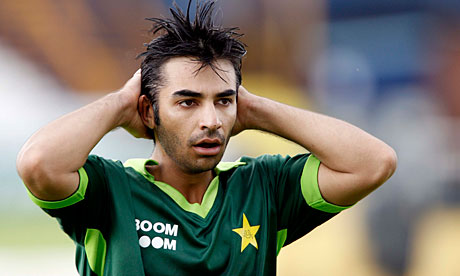Salman Butt, the deposed Test captain of the Pakistan team is "willing" to give lie-detector tests, according to his father, Zulfiqar Ali. Speaking exclusively over his cell-phone from Lahore , the dad said, "My son, Salman has nothing to hide and no reason to speak lie. He is willing to appear before the polygraph machines, if asked, by the International Cricket Council (ICC)".
In August, 2010, Butt and two other players, Mohammad Amir and Mohammad Asif, were among those named by a News of the World sting where undercover reporters paid an agent loosely affiliated with several players on Pakistan's squad a bribe in return for detailed information on when no-balls would be deliberately bowled. Butt, Amir, and Asif were dropped from Pakistan's team for the limited-over series (two Twenty20 games, and five ODI games), however, on September 2, 2010, after the warm-up List A game between Pakistan and Somerset, the International Cricket Council announced that they had suspended Asif, Amir and Butt under the provision of the provisions of the ICC's Anti-Corruption Code.
"We also want the so-called bookie (Mazhar Majeed) and the reporter of the News of the World (NOW) to give lie-tests. However, even if they refuse to do so, my son will not back-out", the Salman Butt's father insisted.
A polygraph (popularly referred to as a lie detector) is an instrument that measures and records several physiological indices such as blood pressure, pulse, respiration, and skin conductivity while the subject is asked and answers a series of questions, in the belief that deceptive answers will produce physiological responses that can be differentiated from those associated with non-deceptive answers.
Former Australian captain Steve Waugh is behind a radical plan to have international cricket players face lie detector tests in a bid to eradicate corruption from the game. Waugh is part of the Marylebone Cricket Club (MCC) World Cricket Committee that met in Perth this week and came up with a number of recommendations it will pass on to the International Cricket Council.
Interesting, in 1994–95 Mark Waugh, the brother of Steve, and Shane Warne had accepted money from an Indian bookmaker in exchange for pitch and weather information. The then Australian Cricket Board (ACB, now known as Cricket Australia) had secretly fined both players for their actions. The ACB's suppression of the case and the actions of the two players were widely condemned.
"Whether Steve Waugh would have still insisted for the lie-detector tests for his brother as well", asks Salman's father. "I shall request our lawyers to take note of this and ask the same to the ICC", Zulfiqar Ali Butt signed off.











